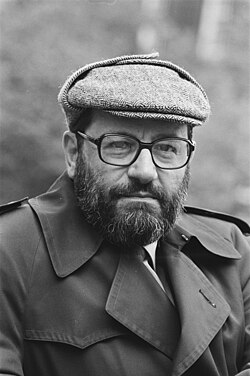Umberto Eco Quote
The great Bonaventure said that the wise must enhance conceptual clarity with the truth implicit in the actions of the simple....""Like the chapter of Perugia and the learned memories of Ubertino, which transform into theological decisions the summons of the simple to poverty." I said."Yes, but as you have seen, this happens too late, and when it happens, the truth of the simple has already been transformed into the truth of the powerful, more useful for the Emperor Louis than for a Friar of the Poor Life.
Umberto Eco
The great Bonaventure said that the wise must enhance conceptual clarity with the truth implicit in the actions of the simple....""Like the chapter of Perugia and the learned memories of Ubertino, which transform into theological decisions the summons of the simple to poverty." I said."Yes, but as you have seen, this happens too late, and when it happens, the truth of the simple has already been transformed into the truth of the powerful, more useful for the Emperor Louis than for a Friar of the Poor Life.
Related Quotes
About Umberto Eco
Umberto Eco (5 January 1932 – 19 February 2016) was an Italian medievalist, philosopher, semiotician, novelist, cultural critic, and political and social commentator. In English, he is best known for his popular 1980 novel The Name of the Rose, a historical mystery combining semiotics in fiction with biblical analysis, medieval studies and literary theory, as well as Foucault's Pendulum, his 1988 novel which touches on similar themes.
Eco wrote prolifically throughout his life, with his output including children's books, translations from French and English, in addition to a twice-monthly newspaper column "La Bustina di Minerva" (Minerva's Matchbook) in the magazine L'Espresso beginning in 1985, with his last column (a critical appraisal of the Romantic paintings of Francesco Hayez) appearing 27 January 2016. At the time of his death, he was an Emeritus professor at the University of Bologna, where he taught for much of his life. In the 21st century, he has continued to gain recognition for his 1995 essay "Ur-Fascism", where Eco lists fourteen general properties he believes comprise fascist ideologies.
Eco wrote prolifically throughout his life, with his output including children's books, translations from French and English, in addition to a twice-monthly newspaper column "La Bustina di Minerva" (Minerva's Matchbook) in the magazine L'Espresso beginning in 1985, with his last column (a critical appraisal of the Romantic paintings of Francesco Hayez) appearing 27 January 2016. At the time of his death, he was an Emeritus professor at the University of Bologna, where he taught for much of his life. In the 21st century, he has continued to gain recognition for his 1995 essay "Ur-Fascism", where Eco lists fourteen general properties he believes comprise fascist ideologies.
